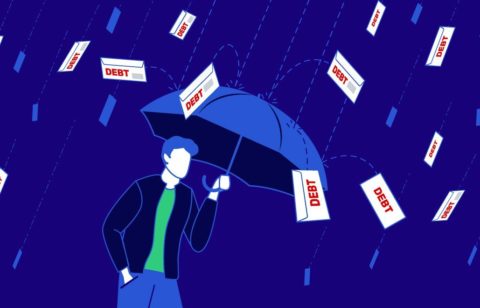I read the other day that a consultant to the debt collection industry had said he couldn’t believe the wealth represented by student loan debt. He actually described it as “lip smacking.” While this consultant said his comment was supposed to be tongue-in-cheek, it did communicate an indisputable truth. The debt collection industry is cashing in because of the many people who are having a serious problem paying off their federally guaranteed student loans.
5.9 million people nationwide
There has been an explosion of people getting student loans and so, too, has the number who have gotten at least one year behind in their payments. In fact it’s around 5.9 million people in the US, which is an increase of 33% in the last five years. What this means is that about 1 in every 6 people with student loans have a balance that’s in default. That’s $76 billion in defaulted loans, which is more than the yearly bill for tuition for all students at public 2-and 4-year universities and colleges.
$1.4 billion to hunt down defaulters
Last year alone, the US Department of Education paid more than $1.4 billion to collection agencies as well as other groups to find people and recover money on their defaulted loans.
What borrowers have learned
People who have defaulted on student loans have learned that beating the government isn’t easy. One 29-year-old woman who had dropped out of school in 2010. She says she has gotten more than six calls a day from debt collectors attempting to recover the $55,000 she owes on her loans. This woman has also learned that the federal government has some serious tools for collecting on these debts that it has allowed debt collection firms to utilize. Two of her tax refunds have already been seized. Other people who are in default have seen their Social Security payments or paychecks garnisheed. The federal government is actually recouping about eighty cents on every defaulted dollar, which is an amazing rate when you compare it to other lenders who are fortunate to recover $.20 on the dollar in credit cards defaults.
Fallen short
One of the problems is that the companies that have been hired to oversee student loans do not earn enough to have lengthy conversations with borrowers about payment options. As a result of this, a program from the government called Income–based Repayment has fallen short of what was anticipated. In this program, people who owe on their student loans pay 15% of their discretionary income for up to 25 years. After that, the rest of their loan is forgiven. However, participation in the program has not been good because borrowers either do not know of the program or are confounded by its complexity.
It can be disastrous
The decision to default on these student loans can be devastating. It can ruin people’s credit and penalties of up to 25% of the balance can increase the amount they owe. As an example of what this can mean, one woman who graduated in 2008 defaulted on a federal student loan of $8000. That balance has grown to $13,000 with penalties and accumulated interest. And unlike mortgages and credit cards, there is no limitations on collecting these federally guaranteed loans. In fact, Congress has made it almost impossible for a borrower to wipe out these debts through bankruptcy.
Business is booming
Some debt collection agencies are thriving due to overdo student loans. In fact these have become a silver lining for the debt collection industry at a time when it’s once thriving business of collecting on credit card debt has diminished and unemployment has made collection a serious challenge.
We can and cannot help
While we cannot help with student loan debt, we can help you with just about any other form of unsecured debt. Our debt counselors can contact your creditors and negotiate settlements that can save you thousands of dollars and get you out of debt in 24 to 48 months. Call our toll-free number for immediate help or fill out the form on the right side of this page for a free estimate. It’s something you should do today.







